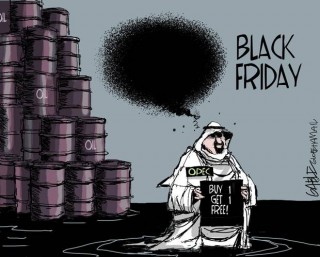Alberta is facing the longest recession in its recorded history and the province’s Finance Minister is warning that the provincial government won’t be able to create enough jobs to employ the thousands of Albertans currently out of work.
Facing the twin shocks of low energy prices and the costly Fort McMurray fire, Alberta’s economy is in free fall and the province’s two-year old recession is getting worse, according to the first-quarter financial update released Tuesday.
Announcing that Alberta’s deficit is now expected to grow to nearly $11-billion this year, Alberta Finance Minister Joe Ceci said the once debt-free province will be $32-billion in debt by the end of the current fiscal year.
“That is a place Alberta hasn’t been,” he said.
With the government deep in red ink, the jobs plan put forward by Premier Rachel Notley’s NDP government will create and sustain 10,000 jobs over the next year, according to the Finance Minister.
“The billions of dollars that have been taken out of the economy as a result of the reduced investment by the oil sector is a tragedy for this province, but it’s not something we can repair,” said Mr. Ceci, who was visibly frustrated.
“The government is not able to shore up the job losses that have happened in private industry.”
Nearly 50,000 net jobs have been lost in the province over the past year and Alberta’s unemployment rate, which hit 8.6 per cent in July, is now expected to average 8 per cent for the remainder of the year. The province’s unemployment rate hasn’t remained that high since the early 1990s.
Since the federal government gave Alberta a $250-million grant in the spring to help with the province’s quickly eroding finances, there has been little concrete help from Ottawa. Millions in stimulus spending promised by Prime Minister Justin Trudeau in February has yet to arrive as both sides continue to work on a funding agreement.
“Quite frankly, Canadians help other Canadians when they are facing tough times. That’s just how Canada works and that’s what we’re going to do,” Mr. Trudeau said while visiting the Alberta Legislature in the spring.
On Tuesday, he was in Barrie, Ont., to announce $1.49-billion in transit funding for that province. A similar agreement with Alberta is expected within the next few weeks. However, even once the cheques are in the mail it’s unclear if many projects can break ground this year because of the looming end of the construction season, the province’s Infrastructure Minister Brian Mason told The Globe on Tuesday.
Alberta’s energy-dependent economy is expected to contract by 2.7 per cent this fiscal year, nearly twice the drop expected in the province’s April budget.
The fire that tore through Fort McMurray in May cost the Alberta government $495-million, pushing the province’s budget deficit to $10.9-billion. The province had expected to run a $10.4-billion deficit this year, the biggest since 1993.
“I don’t need to tell my fellow Albertans that as a result of the oil price shock, the economic headwinds facing Alberta remain strong. Albertans see that every day, many are facing economic hardship,” said Mr. Ceci.
Alberta’s contingency account, a rainy-day fund created when oil prices were higher, will run dry at some point in 2016. When that account is empty, the province will begin borrowing to cover day-to-day expenses. While Alberta had no net debt as recently as early 2015, the province will be spending about $1-billion on debt servicing costs by the end of this year.
Alberta’s economy is expected to improve in 2017, however Mr. Ceci said he doesn’t foresee the province returning to balanced books before 2024.
While the drop in oil prices explains much of Alberta’s economic woes, the province’s opposition parties have said the NDP government has made matters worse. A new carbon tax takes effect on Jan. 1, 2017. The tax will increase the price of everything from gasoline to electricity. Ms. Notley’s government has also increased the corporate tax to 12 per cent from 10 per cent and vowed to increase the minimum wage to $15 an hour by 2018.
Average weekly earnings in the province are now expected to drop by 2.6 per cent in 2016, about 2 percentage points worse than expected in the April budget.
“We have grave concerns that the NDP’s fiscal plan continues to take Alberta down a dangerous path,” said Wildrose MLA Glenn van Dijken. “We’re spending way too much.”
With corporate taxes lower than expected, one of the few bright spots in the government’s finances is a slight increase in the price of oil. The Alberta government now expects a barrel of crude oil to average $45 (U.S.) this year, rather than the $42 budgeted for in April. That small difference translates to $708-million (Canadian) in increased revenues.
On Monday, Statistics Canada reported that investment in Alberta’s housing sector had dropped 30 per cent since June, 2015, to $641-million. It’s the lowest amount of money invested in construction since 2009.
JUSTIN GIOVANNETTI
EDMONTON — The Globe and Mail
Published Tuesday, Aug. 23, 2016 3:44PM EDT
Last updated Tuesday, Aug. 23, 2016 9:58PM EDT

